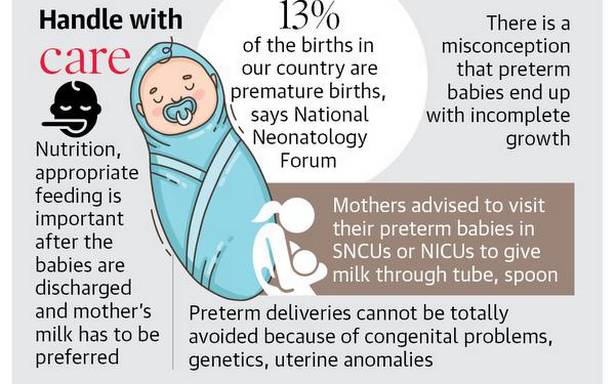Three-quarters of these deaths can be prevented with current, cost-effective interventions, say experts
Families go through tough times if a baby is born with health complications. The situation of families with preterm babies (before 37 weeks of pregnancy) is not hard to imagine: prayer on the lips, trying everything to help the baby recover, heightened concerns.
There is a reason to focus on the latter situation as National Neonatology Forum (NNF)-Telangana State chapter members said that 13% of the births in our country are premature births. They have added that preterm birth complications are the leading cause of death among children under five years of age, responsible for approximately one million deaths in 2015. Three-quarters of these deaths can be prevented with current, cost-effective interventions in India.
As part of World Prematurity Day that was observed on Wednesday, the NNF members on Thursday have detailed the risk factors for premature births, possible measures to try avoid them, what can mothers do, role of family members in taking care of preterm babies at home, importance of breastfeeding and kangaroo care and other crucial aspects.
Secretary of the State chapter, Dr Ramesh B Dampuri and others addressed a virtual press conference held on Thursday.
Pointing out the misconception that preterm babies end up with incomplete growth, they flagged it as a false belief and cited names of prominent politicians, scientists including Albert Einstein who had flourishing lives.
Red flags and remedies
President of the State chapter, Dr Srinivas Murki said that more than 50% deaths or more of newborns are due to prematurity. “If a woman has labour pains before 34 weeks, she should meet a Health Care Worker who will give antenatal steroids which helps in maturity of organs in fetus. And if a mother is expecting delivery before the due date, she should be admitted at a health facility where premature babies are delivered and taken care of; districts hospitals or any health facility with Special Newborn Care Unit (SNCU) can be preferred,” said Dr Srinivas.
He added that if a mother has leaking per vaginum during pregnancy, or has rupture of membrane, then mother has to be given antibiotics. He has suggested mothers to visit their preterm babies in SNCUs or NICUs to give milk to babies through tube, spoon.
Care at home
Problems do not end after the babies are discharged to home, said Dr Dinesh Chirla, national joint secretary, NNF.
“Nutrition, appropriate feeding is important at this stage. Mother’s milk has to be preferred. Alongside, supplements with vitamins, calcium, iron, vitamin D are given too to the baby to ensure they do not have nutritional deficiencies. People should wash hands before they handle the babies,” said Dr Dinesh, director of Rainbow Hospitals.
He added that as preterm babies can become cold easily, maintaining warm temperature is important: they have to be wrapped up. Vaccinations have to be taken on time.
Senior paediatrician, Dr U.S. Jagadish Chandra said that we cannot totally avoid preterm deliveries because of congenital problems, genetics, uterine anomalies. “What can be controlled are hypertension, incompetent cervix, diabetes, avoiding child marriages, taking care of mothers’ nutrition. Early and late pregnancies have to be avoided,” he said.
All of them have stressed on importance of monitoring growth of eyes, brain, and bones in the babies for early detection of complications.
Source: Read Full Article

